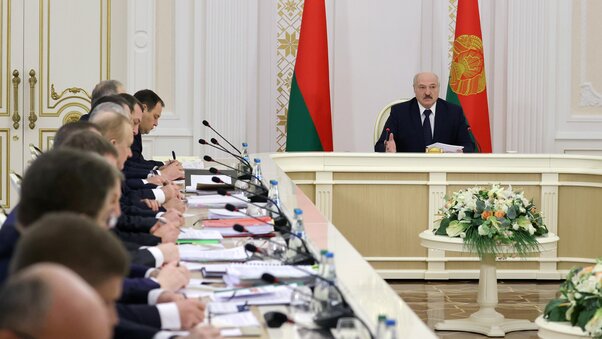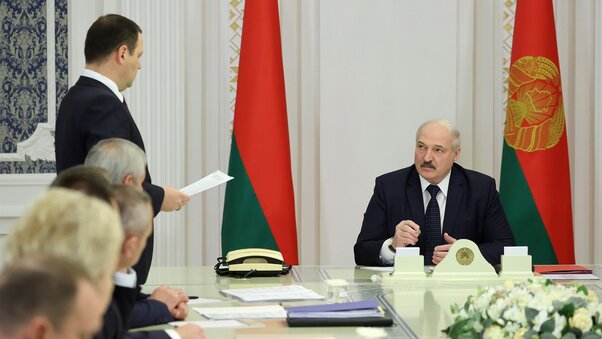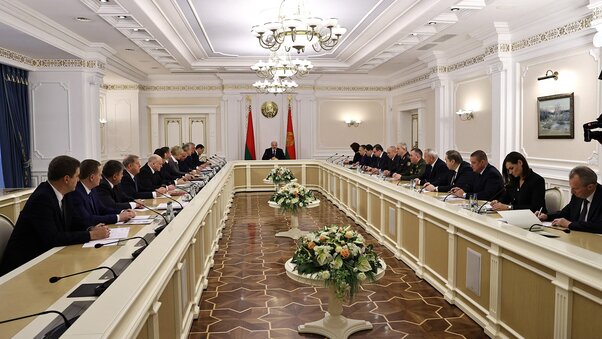Summit of Supreme Eurasian Economic Council
- 5
- 10:06
Belarus President Aleksandr Lukashenko took part in the summit of the Supreme Eurasian Economic Council on 11 December.
Because of the complicated epidemiological situation, the talks of the leaders of the EAEU countries were held online. If a corresponding agreement had been made, the in-person meeting would have been held in Minsk since Belarus is presiding in the EAEU bodies this year.
Apart from the leaders of the EAEU countries, the summit was attended by Honorary Chairman of the Supreme Eurasian Economic Council, First President of Kazakhstan Nursultan Nazarbayev, Moldova President Igor Dodon (the country has an observer status in the union). Uzbekistan President Shavkat Mirziyoyev and Cuba President Miguel Diaz-Canel have been also invited to the summit. These countries are expected to get an observer status in the EAEU at the today’s meeting.
The agenda of the summit included 28 questions. The EAEU leaders discussed four of them at the narrow-format meeting. The most important document on the agenda was the strategic guidelines of developing the Eurasian economic integration till 2025. It was discussed at the summit in May. However, back then the EAEU leaders just approved this draft document in general and made a few remarks.
“The second important question on the agenda is the improvement of mechanisms of applying common antidumping, compensation and special measures for the protection of the interests of manufacturers in our union. The agenda of the summit includes a number of issues of international cooperation. We need to determine the priorities of the operation of the union in this area in 2021,” Aleksandr Lukashenko said about the agenda of the summit.
In his words, at the meetings the heads of state also need to make a decision on the launch of the EAEU free trade agreement with Serbia and to determine the terms for the beginning of the development of the free trade agreement with Iran. “These are landmark documents confirming the interest in our union in the world. Therefore, we encourage the commission to step up the talks with other states,” the Belarusian leader said.
Apart from that, the head of state deemed it necessary to step up efforts to implement Article 41 of the EAEU Treaty, i.e. to start the join promotion of the export of goods and services.
In his speech Aleksandr Lukashenko stressed that the pandemic had convinced even hardcore sceptics that countries of the Eurasian Economic Union can be stronger only if they stand together. “This session will end the year of Belarus’ presidency in the Eurasian Economic Union. We set out to accomplish quite ambitious goals from the start: all-round reinforcement of our union, harmonious development of the economies of the member states, and higher living standards of the citizens. The goals are universal and benefit all the participants,” he noted.
In his words, it is particularly of current interest this year that has been a true test of durability of healthcare, economies, and political systems of all the countries across the globe. “The pandemic has revealed the essence of economic unions and integration associations. In practice it convinced even the most hardcore skeptics that we can be stronger only if we are together. At the same time the coronavirus has demonstrated the true price of failing to fulfill previously reached agreements,” the head of state added.
During the session Aleksandr Lukashenko briefly summarized results of Belarus’ presidency in the Eurasian Economic Union in 2020. He reminded that several regulatory acts had been passed on the transition to a unified or common policy in agriculture, power engineering, and transport. Possibilities of using antidumping, compensatory, and special measures to protect economic interests of merchandise producers in the Eurasian Economic Union were considered. The sides went on with the reconciliation of approaches to principles and mechanisms of operation of the state regulation of the integrated forex market, the expansion of usage of the national currencies of the EAEU member states in mutual transactions, the work meant to reduce the use of foreign currencies in the EAEU economies, the establishment of the common transaction infrastructure and payment space.
Aleksandr Lukashenko pointed out: “A number of measures were initiated to substitute imports in the manufacturing industry and agriculture. However, members of the union periodically violate agreements and submit proposals on the duty-free import of various third-country goods, which analogues are made inside the union. Revenues of our state budgets suffer because of that. In fact we support foreign manufacturers and discredit our joint work on advancing manufacturing cooperation and reducing dependence on import.”
The President believes that it is worth using the potential of the EAEU to promote goods to third markets. “I positively assess the activity of the commission to develop a balanced agricultural market on the basis of the interstate cooperation and the system of forecasting the development of the EAEU agro-industrial complex. At the same time, I believe that the potential of the Union should be used not only for the development of the domestic market but also for the promotion of agricultural products to the markets of third countries,” said Aleksandr Lukashenko.
According to the President, a number of decisions regarding technical regulations has been taken in the EAEU this year. Work is underway to harmonize the laws of EAEU member states to establish liability for violations of mandatory requirements for products, and also rules and procedures for conformity assessment.
“Unfortunately, there are no results in regulating methods to control the content of medicines in food products of animal origin, including processed foods. The issue has remained unsolved for several years already. I believe that the commission should regulate the matter next year,” the head of state stressed.
According to Aleksandr Lukashenko, this year the EAEU has intensified work to remove barriers and reduce exceptions and limitations in the internal market of the Union. Some progress has been made to curb the emergence of new types of barriers. “This is not enough, however. No administrative procedure has been introduced for national restrictive measures with their preliminary consideration by the EAEU bodies. There is still a loophole in the form of a possibility of multiple introduction of exceptions in state procurement programs,” the President said.
The head of state remarked that the powers of the Eurasian Economic Commission should be expanded. “We initiated work to strengthen the powers of the Eurasian Economic Commission. However, so far it has made little headway. What kind of development can we talk about if the Eurasian Economic Commission is still not able to apply as an independent entity to the Court of the Eurasian Economic Union on controversial issues?” Aleksandr Lukashenko asked.
Reviewing the results of the EAEU’s work this year, the President noted that despite the difficulties caused by the pandemic the EAEU kept working to boost cooperation with international organizations. A number of events were held under trade agreements with China, Vietnam and Iran. Negotiations are ongoing to sign trade agreements with Egypt, Israel and India. Preparations are underway to launch negotiations on the liberalization of trade regimes with Indonesia and Mongolia.
“As part of the digital agenda, we are establishing a system of transport corridors. We keep cooperating in manufacturing, subcontracting and technology transfer. We also provide assistance in employment for citizens of the EAEU member states,” the head of state added.
Not all the points of the program of the Belarusian chairmanship were fulfilled due to objective circumstances, Aleksandr Lukashenko noted. Some of the activities needed much more time than one year. However, the President is convinced that joint work in the proposed areas will continue next year. According to him, the tasks of the Belarusian chairmanship, aimed at strengthening and developing the EAEU, are in many respects consonant with the ideas of Kazakhstan that will take over the EAEU chairmanship for 2021 on 11 December.
The Belarusian leader remarked that the bulk of attacks from outside the Eurasian Economic Union is aimed primarily at Russia. “We all see that the time is not easy. It is difficult, first of all, for our close friends and brothers - the Russian Federation. You see that the cutting point of attacks from outside is directed at Russia, we feel this very well in Belarus,” Aleksandr Lukashenko said.
The President wished his Russian counterpart Vladimir Putin patience during these difficult times. “As our honorary chairman [Nursultan Nazarbayev] said, Russia is the backbone of our integration. Therefore, we wish you all the patience in the world. You should know that we have always supported Russia and we will always be by its side, because integration in the post-Soviet space is impossible without it,” Aleksandr Lukashenko added.
First President of Kazakhstan Nursultan Nazarbayev and Kazakhstani head of state Kassym-Jomart Tokayev also spoke at the EAEU summit.
Aleksandr Lukashenko noted: “We’ve had a complicated leap year of 2020. The year 2021 will not be simple either. I know that in Kazakhstan the year will begin with parliamentary elections. We would like to wish success to Kazakhstan with this political campaign. You can see that it will not be a simple one at the example of Belarus and other countries. This is why we are going to root for you. We will by all means support your efforts to create a stable, powerful, and prosperous Kazakhstan.”
On 11 December, the EAEU members approved a decision to give an observer status in the EAEU to Uzbekistan. “We are convinced that you will observe us for a short period of time and will make a decision to become a full-fledged member of our union in the near future, as you have put it in a right way, if it benefits the people of Uzbekistan. You know that we will be happy to see you as a full-fledged member of our union,” Aleksandr Lukashenko said.
Uzbekistan President Shavkat Mirziyoyev, in turn said that his country is keeping an eye on the development of integration processes and the operation of the EAEU. “We want to emphasize a growing international authority of the organization and a wide geography of practical cooperation with foreign countries,” he said.
In his words, the EAEU countries are the major natural trade partners for Uzbekistan. “It is important to make ample use of the huge potential of our countries, join efforts to eliminate barriers and obstacles in trade relations, create new markets together,” Shavkat Mirziyoyev said. “The economies of our countries are largely complimentary, even in the fields where we were competitors a few years ago. Our leading enterprises maintain efficient cooperation and penetrate markets of third countries together. We are interested in the deepening of industrial cooperation and the formation of sustainable chains for the formation of the added value on the basis of advanced experience and innovative approaches.”
Shavkat Mirziyoyev thanked the EAEU leaders for the decision to give an observer status to Uzbekistan and expressed hope that it will “open up vast opportunities for the further enhancement of relations of friendship and multi-faceted cooperation.”
The Belarusian President hopes for constructive cooperation of Cuba and Uzbekistan with the EAEU. Aleksandr Lukashenko welcomed these two countries and wished them many successes.
The Belarusian head of state emphasized the importance of the presence of Uzbekistan in this integration association.
Speaking about Cuba, Aleksandr Lukashenko said: “Cuba is far from us geographically, but historically you have always been with us. We know you very well from the days of the Soviet Union. I am sure that your contribution to expanding our economic cooperation will be significant. I am sure that both Cuba and Venezuela, with whom all of us, members of the union, maintain good relations, will be a good springboard to expand our cooperation with entire Latin America,” the President said.
During the discussion the heads of state shared opinions about integration prospects and the international situation in the economy. “We see that it is complicated. But we have all tools to cope with this situation,” Aleksandr Lukashenko said to sum up the results of the extended participation meeting.


